JONATHAN COHEN: SELECTED
PUBLICATIONS
[Key: Boldface = Book; C = Criticism; J = Journalism; P =
Poetry; T = Translation (Poetry)]
2026
Celeste, Daughter of the Earth and Other Early Poems [T]. By Enrique Lihn. With tr. David Unger. New York: New Directions. In press (scheduled for October 2026).
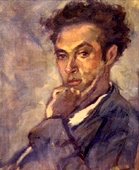 
"In one of the many self-deprecating jokes he used to share with his closest friends, the poet Enrique Lihn once referred to the texts grouped in this book as his 'butcher's notebooks.' By this he was not alluding to anything bloody, but rather to the provisional, unstable, and hastily made character of the poems in his early books, Nada se escurre (Nothing slips away; 1949) and Poemas de este tiempo y de otro (Poems of this time and another; 1955). A butcher would puff up his chest at such a clever phrase, and a florist might envy the metaphor for her shop of roses and thorns. As for the translators of this volume, Jonathan Cohen and David Unger — who, along with John Felstiner, had already collaborated on the translation of Lihn's poetry for New Directions (The Dark Room and Other Poems, 1978) — they can only smile with joy to return to the task, redeemed by time." — From the Introduction by Roberto Brodsky, author of La casa que falta (The missing house)
"There is no lucidity like that of Enrique Lihn." — Nicanor Parra
"Jonathan Cohen and David Unger's English translations of Lihn read like poetry instead of translations, which is quite an accomplishment." — Ron Padgett
"Lihn was without a doubt the best poet of his generation, the so-called Generación del '50, and one of the three or four best poets born between 1925 and 1935. Or maybe one of the two best. Or maybe he was the best. … To engage with his poetry is to confront a voice that questions everything. That voice, however, does not come from hell, nor from millenarian prophecies, nor even from a prophesying ego. Rather, it is the voice of an enlightened citizen, a citizen who hopes to reach modernity or who is resignedly modern." — Roberto Bolaño
"Lihn's early poems are 'introverted, emotional, and philosophical,' to borrow his adjectives. An intimate poetry, with carefully articulated beginnings and well-defined endings, these initial efforts often take death as their subject, 'that obsession of adolescence: the sense of life and its precariousness' as he would later remark. This theme, however, remained important throughout the length of his work." — Mary Crow
"Enrique Lihn is a unique poet; like Rimbaud, he is tempted to keep silent. By maintaining the rent between language and reality, however, he has turned the act of writing poetry into its own defense." — George Yudice, Review: Latin American Literature and Art
"Enrique Lihn has been one of the most intriguing and respected artists of the twentieth century in a land famous for its outstanding poets. … New readers of Lihn's work will find an art form as colorful, tempestuous, refreshing, romantic, lyrical, insightful, and mired in contradiction, visionary and defeatist, in love and at odds with the world, as was its author." — Christopher M. Travis, author of Resisting Alienation: The Literary Work of Enrique Lihn
|
"Epilogue" [T]. By Enrique Lihn. Paris Review. In press.
My Excellency: On William Carlos Williams's "Lost" Translation of Luis Rechani Agrait's Masterpiece [C]. Podcast: New Books Network.
"The Old Age of Narcissus"; "Fear"; "Prayer" [T]. By Enrique Lihn. On the Seawall. In press.
2025
My Excellency: Comedy in Three Acts [C]. By Luis Rechani Agrait; translated by William Carlos Williams. Editor and introducer ("Recovering Williams's Translation Debuting Rechani Agrait in the American Idiom"). Foreword by Julio Marzán; afterword by José Luis Ramos Escobar. Chicago: Swan Isle Press.
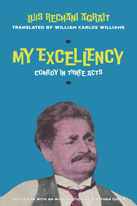 
Williams Carlos Williams's "lost" translation of Luis Rechani Agrait's masterpiece. My Excellency is a political farce that resonates with the warp of politics around the world. Set in an "imaginary country" that resembles Puerto Rico during the Great Depression, the play focuses on the plight of an idealistic but naive man, Buenaventura Padilla, in a completely corrupt political system. Through an unscrupulous election he becomes the nation's leader. The play is successful as a satire largely because of Buenaventura's hilariously funny language — recreated by Williams — with its grandiloquent style combined with stunning malapropisms and clownish errors in history and grammar. In the end, what makes the audience laugh at a scene is what actually causes suffering in real life. Buenaventura remains one of the best-known characters of Puerto Rican drama. Ultimately, My Excellency shows the corrupting power of success and the tragic flaw of materialism. Driving the comedy in Williams's translation is his firm command of the play's dialogue interwoven with popular idioms in which the charm of pure nonsense abounds.
"A terrific piece of work, a terrific satirical piece, with so much humor and tragedy mixed in. This translation adds another piece to the complex portrait that was William Carlos Williams, that blend of American English and his rich Puerto Rican roots." — Paul Mariani, University Professor of English Emeritus, author of William Carlos Williams: A New World Naked
"My Excellency is a theatrical piece that its author, Luis Rechani Agrait, gifted to William Carlos Williams during the latter's first visit to Puerto Rico. With this edition of Williams's overlooked translation of My Excellency, Jonathan Cohen gifts readers a richer understanding of Williams's encounters in and interactions with the island that would forever engender intellectual and sentimental curiosity for the writer. Moreover, Cohen reminds us of the diverse genres that occupied Williams throughout his life, and of the way that translation would always remain a lifeline of his creative practice." — María del Pilar Blanco, professor of Spanish American and comparative literature, University of Oxford, author of Ghost-Watching American Modernity: Haunting, Landscape, and the Hemispheric Imagination
"In recovering Williams's translation of Mi señoría, Jonathan Cohen offers readers a significant surprise, as he has done before with previously unknown translations by him. Thanks to this recovery work, we have more of Williams now, and with this book we can further appreciate the undeniable Carlos (versus Bill) in him and his canon." — From the Foreword by Julio Marzán, author of The Spanish American Roots of William Carlos Williams
"Most readers will be drawn to My Excellency by the translator's name, and the poet does not disappoint. Williams spoke of translating into 'American,' and with that in mind, produced the kind of domesticating translation no longer in fashion. The American reader will find the language for the most part familiar, from Carmela's lovelorn reveries ('There was no misery, no riches … Because what difference did it make, one thing or another?') to the policeman's offer 'to give a good clubbing to those you don't like.' Most impressive, however, is his handling of Buenaventura himself, whose constant grandiose philosophizing is deflated in almost every sentence by malapropisms and mixed metaphors (or 'semaphores,' as he would call them). Many translations of voices like this have an air of problem-solving to them, producing accurate but awkward and heavily footnoted phrases, but Williams's prioritization here of a natural American English and genuinely funny lines is a good one: it makes for an enjoyable read, and a translation that seems to me truer to Rechani Agrait's intentions and politics. Consider his stage direction at the start of the play: 'The workers are encouraged to corrupt the language according to their own taste.'" — Henry Gifford, Asymptote
|
Review of In My Eyes, You Are Beautiful, by David Unger [C]. American Book Review 46.3: 79–82.
"The 'Spanish-American Number' of Others: Vanguard of Pan-American Poetry and American Modernism" [C]. Tides of Progress: Print Culture and Anglo-Hispanic Exchanges, 1890–1945. Eds. Ana Rodríguez Navas and Peter Hulme. New York: Bloomsbury Press. 65–84, 206–10.
|
"Cohen examines a 1916 issue of the modernist poetry magazine Others that, under the editorial eye of William Carlos Williams, was the first of its kind in the United States to be devoted exclusively to English translations of Spanish-American poetry. Called the 'Spanish-American Number,' the special Hispanic issue contributed to the growing literary bicultural dialogue in the United States at the time. It contained twelve poems by seven poets from Guatemala, Peru, Honduras, Cuba, Argentina, and Colombia. Its full-page 'Manifesto' reflected the idealistic Pan-Americanism of the turn of the century. True to the avant-garde mission of the magazine, the issue demonstrated the equal value of Latin American poetry relative to US poetry, elevating its status. Cohen argues that the issue's importance is greater historically because of Williams's role in making the translations, which showcase not only his use of modernist translation poetics but also the Hispanic roots of his influential modernism."
|
2024
"From Countersong to Walt Whitman" [T]. By Pedro Mir. The Serpent and the Fire: Poetries of the Americas from Origins to Present. Eds. Jerome Rothenberg and Javier Taboada. Berkeley: U of California P. 121–22.
"Muna Lee's Carrera Andrade: The Literary Event of Secret Country" [C]. Translation Review 120.1: 84–91.
"With William Carlos Williams in Mayagüez" [C]. Tinta regada. Instituto Nuevos Horizontes, Departamento de Humanidades, Universidad de Puerto Rico-Mayagüez.
2023
"Evolving to Science Poetry: Three Poems by Ernesto Cardenal" [C/T]. American, British and Canadian Studies 41.1:
239–46.
Poems of Good Love … and Sometimes Fantasy [T]. By Pedro Mir. Leeds, UK: Peepal Tree Press.
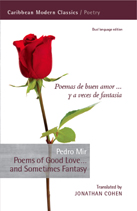 
"In showing the most difficult and refractory side of Mir's work, Cohen has opened the eyes of the reader to the poet's impresssive overall achievement." — Nicholas Birns, Review: Literature and Arts of the Americas
"Reading these poems, flawlessly made — what else to expect from an author of poems revered universally — and justly! — wherever his language is spoken? — and translated by the learned and devoted Jonathan Cohen, who misses not a beat of the music or a shiver of the imagery and its effect, I was surprised.… The choice of words in English is so precisely accurate, and creates such a perfect scene and music so right, that were the reader unaware of the author or his language, he would not be able to tell the original from the translation.…
"Mir writes as if from inside the male voice telling the story of how hard it can be to tame sex undulcified, and Cohen follows so closely that he seems to be inside the same mind, and yet when he becomes himself again and no longer the voice of another man's book, the reader cannot know where either man stands with respect to this view of a reality composed of what we are and would rather not be. We know only that we've learned something obviously real, profoundly human, self-contradictory, and hard to either escape or accept, or ever forget." — Rhina P. Espaillat, American Book Review
"Jonathan Cohen's dexterous English rendition of Pedro Mir's least accessible volume of verse Poemas de buen amor … y a veces de fantasía (1969) succeeds remarkably at making the poet's difficulty available in a way which does justice to the book's reticence to speak plainly. Cohen here achieves a major feat of enabling pure communication by conveying the opacity of Mir's Spanish original in an English version that renders the elusiveness legible without turning it into clarity. The translator enables the reader to appreciate the density of Mir's utterance, respecting his choice to withhold access to his unsayable feelings and thoughts.…
"It may be that the discursive opacity of Poems of Good Love reflects Mir's own hunch vis-à-vis the tenets that informed the volume. The collection's lesser transparency in relation to the rest of the poet's oeuvre involves the content no less than the form, and we ought to be grateful to Jonathan Cohen for having rendered the opacity of both digestible to an Anglophone readership." — From the Introduction by Silvio Torres-Saillant, author of Caribbean Poetics
"Pedro Mir … Pure genius." — Junot Díaz, New York Times
|
Review of Walt Whitman and His Caribbean Interlocutors: José Martí, C.L.R. James, and Pedro Mir: Song and Countersong, by Rafael Bernabe [C]. New West Indies Guide 97: 331–435.
"Why Do We Call It 'America'?" [C]. American Heritage 68.7.
2022
"'Countersong to Walt Whitman': Pedro Mir's Radical Dialogue with the Bard" [C]. TIES: Revue de littérature du groupe Textes Images et Sons 7.
"Mark Kirschen" [C]. Poets. Poetry Foundation.
"Prayer for Marilyn Monroe" [T]. By Ernesto Cardenal. I Wanna Be Loved by You: Poems on Marilyn Monroe. Eds. Susana Case and Margo Taft Stever. Hamilton, OH: Milk and Cake Press. 60–61.
"Remembering a Great Love in Letters: Salomón de la Selva to Edna St. Vincent Millay" [C]. Literary Imagination 24.3: 271–80.
Review of The Valley Loses Its Atmosphere, by Winétt de Rokha, tr. Jessica Sequeira [C]. Studies in Travel Writing 25.4: 526–28.
"William Carlos Williams's The Dog and the Fever: Baroque Proto-Modernism as American Modernist Innovation" [C]. William Carlos Williams Review 39.2: 135–59.
2021
"Demand of the Centuries" [T]. By Pedro Mir. Massachusetts Review 62.2: 246.
"Invitation"; "Sonnet of the Grateful Girl"; "Seafaring Date with an Imaginary Woman"; "Residence in Fruit" [T]. By Pedro Mir. Asymptote.
"Recovering a Masterpiece of Social Prose: William Carlos Williams's Lost Translation of 'Cage'" [C]. Translation Review 110.1: 4–14.
2020
"On Pedro Mir" [C; winner of essay contest]. Asymptote.
Citation of contest judge J. M. Coetzee:
"Note 1. I have taken it as my job to judge these essays first of all as pieces of persuasive writing, meant in each case to introduce and plead the case of a neglected author. To supplement the essays, I have read as much of the work of each author as I can easily lay my hands on not only the selections quoted in the essays but also what is accessible via the internet. I have done so in order to check that the writer is indeed neglected, and that the essay-writer's estimate is not an obviously inflated one.
"Note 2. Because Asymptote is published in English, I have taken the term 'neglected' to mean neglected in the Anglophone sphere. A number of the writers discussed are available in French or German translation but not in English.
"Pedro Mir (1913–2000), declared a non-person under the Trujillo dictatorship but widely accepted nowadays as the Dominican Republic's greatest poet, is barely known in the Anglophone world. Jonathan Cohen makes a persuasive case that he is in the same league as his contemporary Pablo Neruda, arguing the claim with undisguised enthusiasm, and supporting it with insightful commentary and exemplary quotation from Mir's work."
|
"Our Age of Translation and the 1970 World of Translation Conference" [C]. Translating the Future: Archival Materials. PEN America.
"Remembering Ernesto Cardenal" [C]. Review: Literature and Arts of the Americas 53.2: 319–22.
"Sonnet of the Young Girl"; "Sonnet of the Pure Girl"; "Sonnet of the Pregnant Girl" [T]. By Pedro Mir. Poetrybay.
2019
Two Elegies of Hope ("Hurricane Neruda" and "To Julia with No Tears") [T]. By Pedro Mir. New York: Spuyten Duyvil.
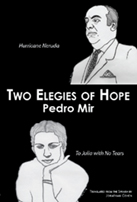 
"With his deft and lyrical translation of Two Elegies of Hope by Pedro Mir, Jonathan Cohen brings a powerful trinity of poets to English readers: Pablo Neruda and Julia de Burgos, as elegized by our very own Whitman of the Caribbean, Pedro Mir. More and more North American readers are learning about the work of Mir who sang of our island and illuminated our struggles over the course of many dislocations. His fierce and profound singing of those struggles has inspired many writers and activists from our part of the Americas, myself included. Cohen translates Mir's words as if there were no borders between the two languages and sensibilities all occupying the same human heart, and Chiqui Vicioso's succinct and informed introduction helps us understand the importance of Mir's work in understanding our American history, its struggles, tragedies and its ultimate triumph through the work of our poets. How wonderful to share — through Cohen's poet's sensibilities and skill — nuestro Pedro Mir with the English-speaking world. I feel immense pride in the arrival of this small but powerful book to an English readership." — Julia Alvarez, author of How the García Girls Lost Their Accents and In the Time of the Butterflies
"Two Elegies of Hope, a volume containing superior translations of Pedro Mir's 'El huracán Neruda' and 'A Julia sin lágrimas,' two remarkable elegiac poems that had remained unavailable to Anglophone readers since their original publication over 40 and 20 years ago, respectively, captures the emotional force, surrealistic diction, and political clarity of the acclaimed Dominican poet's oeuvre. Memorializing great twentieth-century bards from the hemisphere whom Mir admired deeply, the Puerto Rican Julia de Burgos and the Chilean Pablo Neruda, these texts reaffirmed his view of poetry as a prophetic art whose practitioners, in certain circumstances, may wield the moral power to speak for multitudes, articulate their yearnings, and advance the cause of humanity. As such, though written in his later years, they can serve as an introduction to his compelling body of verse no less suitably than the poems corresponding to earlier stages of his career, a sizable share of which Jonathan Cohen has also translated superbly." — Silvio Torres-Saillant, author of Caribbean Poetics and The Dominican Americans (with Ramona Hernández)
"Pedro Mir is a poet who evokes the history of the American continent with a revelatory and prophetic tone but also with an extraordinary lyricism. The figures of Pablo Neruda and Salvador Allende and the end of democracy in Chile are woven together masterfully in a tough rebellious poetry. Appearing here as well is the figure of Julia de Burgos, poet of the Caribbean, poet of light and water but also of a heartbreaking sorrow. Two of the great figures of Latin American poetry talk about a battered but still luminous continent. A book to read many times and to meditate on. These poems have been wonderfully translated by Jonathan Cohen." — Marjorie Agosín, author of Of Earth and Sea: A Chilean Memoir and I Lived on Butterfly Hill
"Pedro Mir … Pure genius." — Junot Díaz, New York Times
"In my last encounter with Don Pedro, already very ill, he declared that he was dying from the 'defeat of my generation,' a political defeat, but not poetic, because Don Pedro lives triumphant in the memory of his poems, accompanied, as he ought to be, by Hurricane Neruda, now I imagine a gentle breeze on the Olympus of the poets, and of course with Salvador Allende.… [Planning the centennial in Santo Domingo of Julia de Burgos's birth, my colleagues and I] had also wanted a poem from the national poet of our island to the national poet of Puerto Rico, and so my second objective was to motivate Don Pedro to write it, to convince him that only he could do it, and to underscore and revive the links that tied them together, from their mothers to their ideology, from their political struggles to their visions of countryside, their hope for the future. And so, 'To Julia with No Tears' was born, because neither Julia nor Don Pedro wanted to have tears associated with their names." — From the Foreword by Chiqui Vicioso ("Don Pedro Mir and His Hope for the Future"), author of Cómo escribir un poema con Pedro Mir (How to Write a Poem with Pedro Mir) and Julia de Burgos: La nuestra (Julia de Burgos: Ours)
"Jonathan Cohen's translation of 'Huracán Neruda' (1975) and 'A Julia sin lágrimas' (1998) continues his long association with the Dominican poet Pedro Mir (1913–2000).… These two wistful elegies, occasioned by the very different lives and fates of the Chilean Nobelist Pablo Neruda (1904–1973) and the Puerto Rican poet Julia de Burgos (1914–1953), poignantly complement each other here through Mir's inscription of
both figures into a broader panorama of supranational influence and identity.… At the end of his Translator's Preface, 'Journey into These Poems of Pedro Mir,' Cohen succinctly states his strategy as follows: 'With my translations here I have aimed to recreate Mir's voice in American English. Fidelity to the meaning of his Spanish guided me in rendering every line, but fidelity to the poetic quality of his verse was paramount. I wanted each translation to be an accurate equivalent as well as a beautiful poem in its own right, in order to serve him in the best possible way.' Cohen, an award-winning scholar and translator of such leading Latin American lights as Ernesto Cardenal, Octavio Paz, Enrique Lihn, Roque Dalton, and Homero Aridjis, has largely succeeded in reaching these goals." — Gregary J. Racz, Translation Review
"Jonathan Cohen has devoted many years to rendering Mir in English, and this latest volume is his crowning effort." — Nicholas Birns, Review: Literature and Arts of the Americas
|
"Waldeen's Neruda: Translating the Dance" [C; with presentation of the previously unpublished "Coming of the Rivers" sequence of Neruda's Canto General translated by Waldeen]. Asymptote.
2018
Countersong to Walt Whitman and Other Poems [T]. By Pedro Mir. With tr. Donald D. Walsh. Leeds, UK: Peepal Tree Press.
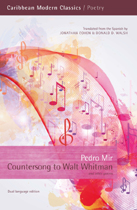  "Jonathan Cohen and the late Donald D. Walsh have beautifully translated Pedro Mir's Countersong to Walt Whitman into the English language. Pedro Mir (1913–2000) was the Poet Laureate of the Dominican Republic, and it seems impossible that no other translations of his works can be located in an English-language rendition. We say this not because translation should constitute a form of recognition, but because it provides an opportunity for dialogue and, in this case, the sounding of a counter song. Face-to-face with the Caribbean Sea, Mir's Countersong reanimates Walt Whitman's original, tranquil, intense energy of expansiveness as he simultaneously narrates a history of US expansion. Mir repurposes Whitman's vigor and song to incite opposition to military and economic subjugation. Cohen and Walsh's poetry translation sings as weighty, acutely restrained, and rhythmic as the original work." — Judges of the 2019 National Translation Award in Poetry of the American Literary Translators Association
"Jonathan Cohen and the late Donald D. Walsh have beautifully translated Pedro Mir's Countersong to Walt Whitman into the English language. Pedro Mir (1913–2000) was the Poet Laureate of the Dominican Republic, and it seems impossible that no other translations of his works can be located in an English-language rendition. We say this not because translation should constitute a form of recognition, but because it provides an opportunity for dialogue and, in this case, the sounding of a counter song. Face-to-face with the Caribbean Sea, Mir's Countersong reanimates Walt Whitman's original, tranquil, intense energy of expansiveness as he simultaneously narrates a history of US expansion. Mir repurposes Whitman's vigor and song to incite opposition to military and economic subjugation. Cohen and Walsh's poetry translation sings as weighty, acutely restrained, and rhythmic as the original work." — Judges of the 2019 National Translation Award in Poetry of the American Literary Translators Association
"We need a lot more books in English about the Dominican experience. Fortunately the field is growing, and there's some good stuff out there. I recommend one start with one of the country's greatest poets, Pedro Mir, his Countersong to Walt Whitman and Other Poems. Pure genius." — Junot Díaz, New York Times
"[Mir's] poetry achieves a rare, exceptionally felicitous marriage of poetry and politics, of individual sensibility and the chronicling of quotidian collective drama, the still unfulfilled promise of Latin America, its landscape, peoples, and societies.… The translations convey the colloquial pulse and feel, the allusive, melodic reverberations of Mir's exacting expertise." — Roberto Márquez, Village Voice
"The present bilingual edition will give both Spanish- and English-speaking readers the opportunity to recognize themselves in the poetic visage of one of the most authentic literary artists to have come from the Caribbean. Readers will find here a voice that speaks to the world as urgently as it does to the Dominican people." — From the Introduction by Silvio Torres-Saillant, author of Caribbean Poetics
"Su traducción me ha fascinado. Sin ser literal, ni mucho menos, es tan fiel y conserva tanto el estilo mismo y en general el espíritu del poema, que a veces pienso que supera el original." [Your translation fascinates me. Without being literal, not in the least, it is so faithful and preserves the very style and on the whole the spirit of the poem so much, that at times I think it surpasses the original.] — Pedro Mir, letter to Jonathan Cohen
|
The Dog and the Fever: A Perambulatory Novella [C]. By Pedro Espinosa; translated by William Carlos Williams. Editor and introducer ("William Carlos Williams and His Clever Dog: Conceptismo with a New Jersey Twist"). Middletown: Wesleyan UP.
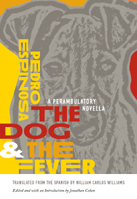  "In his 'Introduction,' Cohen enlightens us with an exquisite treatment of Williams's context and trajectory, described in detail. Cohen's observations encompass how Williams links modernism and the work of translation as essential to a living American idiom and how Espinosa's original work had been attributed to Quevedo, while providing other information and implications drawn from Williams's autobiography. This little book is a treasure." — Claudia Routon, Translation Review
"In his 'Introduction,' Cohen enlightens us with an exquisite treatment of Williams's context and trajectory, described in detail. Cohen's observations encompass how Williams links modernism and the work of translation as essential to a living American idiom and how Espinosa's original work had been attributed to Quevedo, while providing other information and implications drawn from Williams's autobiography. This little book is a treasure." — Claudia Routon, Translation Review
"England never knew that Golden Age Spain invented the sixteenth- and seventeenth-century European drama, poetry, and novel. Jonathan Cohen clarifies the entangled wonders in William Carlos Williams's translation of The Dog and the Fever by Pedro Espinosa, whose outrageous dog's tale recalls Miguel de Cervantes's earlier masterpiece, The Dialogue of the Dogs. Williams's vital English version mirrors Espinosa's unsurpassed dog novel related by an eloquently talkative canine." — Willis Barnstone, author of ABC of Translation
"We owe Jonathan Cohen a debt of thanks for bringing to the center of our attention this unexpectedly modern seventeenth-century whirlwind of imagistic language. The accomplished, proto-surreal, avant-garde experimentalism is helped along by William Carlos Williams's keen eye and sympathetic ear, and Cohen's sensitive editing." — Edith Grossman, author of Why Translation Matters
"This 'dredges of language' novella as Williams wanted it published, with his running commentary on both the work and his translation: Williams reveling in America's modernist future as he reclaimed his (and therefore its) Spanish literary heritage." — Julio Marzán, author of The Spanish American Roots of William Carlos Williams
"Anything that William Carlos Williams put his hand to is more than worth reading, and Pedro Espinosa's The Dog and the Fever is no exception. The text, with its tumble of aphorisms and proverbs, reads like proto-dada or surrealism, and when we realize that Williams did the translation project with his elderly mother, Raquel Elena Hoheb, it takes on the importance of a family project.…
"Jonathan Cohen, a poet and noted translator, who has already gathered Williams's translations in By Word of Mouth: Poems from the Spanish, 1916–1959 and prepared a new edition of Williams's breakthrough book, Al Que Quiere!, has done Williams readers a great service in blowing the dust off this translation and sprucing it up for a new century." — Bill Zavatsky, author of Where X Marks the Spot
"A novella of extraordinary sensuality, humor, and lyrical imagination, translated with exquisite delicacy by William Carlos Williams, whose love of the Spanish language is manifested in this work. A book to treasure." — Marjorie Agosín, author of The White Islands / Las Islas Blancas
"The Dog and the Fever is a fantastic piece of work, and I can see many reasons why William Carlos Williams was taken by it, especially by the sense of the language that Espinosa got down on the page. It is Williams himself listening to the living language around him there in Rutherford or Paterson or Manhattan and then working to get what he heard — the music of it! — likewise down on the page.…
"By adding Williams's own comments from his letters and Autobiography, as well as comments he added to the manuscript drafts of the novella, Jonathan Cohen has given us a much better sense of how Williams's Spanish heritage and his lifelong interest in Spanish and Latin American poetry enter into his complex epic. And that's the point: to more fully understand Williams's achievement as perhaps the foremost twentieth-century poet writing in the American grain." — From the Foreword by Paul Mariani ("In the Everyday Idiom of Spain"), author of William Carlos Williams: A New World Naked
|
"Empty Hills — Deep Woods — Green Moss: William Carlos Williams's Chinese Experiment" [C]. Words Without Borders, April 26.
"Managua 6:30 P.M." [T]. By Ernesto Cardenal. Capitals: A Poetry Anthology. Ed. Abhay K. New Delhi: Bloomsbury. 136–37.
2017
Al Que Quiere! — "The Centennial Edition" [C]. By William Carlos Williams. Editor and introducer ("This Voice We Call Williams"). New York: New Directions.
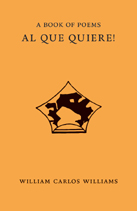  "Distinct and as different as possible from the orderly statements of Eliot … are the poems of Carlos Williams, represented … in a new book of his own, Al Que Quiere, 'To Whom It May Concern.'… I do not pretend to follow all of his volts, jerks, sulks, balks, outblurts and jump-overs; but for all his roughness there remains with me the conviction that there is nothing meaningless in his book, not a line.… He is rooted. He is at times almost inarticulate, but he is never dry, never without sap in abundance." — Ezra Pound, The Future
"Distinct and as different as possible from the orderly statements of Eliot … are the poems of Carlos Williams, represented … in a new book of his own, Al Que Quiere, 'To Whom It May Concern.'… I do not pretend to follow all of his volts, jerks, sulks, balks, outblurts and jump-overs; but for all his roughness there remains with me the conviction that there is nothing meaningless in his book, not a line.… He is rooted. He is at times almost inarticulate, but he is never dry, never without sap in abundance." — Ezra Pound, The Future
"It seems clear that Williams is the twentieth-century poet who has done most to influence our very conception of what poetry should do, and how much it does not need to do." — The New York Review of Books
"We have the profound satisfaction of publishing a book in which, we venture to predict, the poets of the future will dig for material as the poets of today dig in Whitman's Leaves of Grass." — From the Dust Jacket of the 1917 Edition of Al Que Quiere!
"My translation of the phrase Al Que Quiere! is, 'To Him Who Wants It,' and I have always associated it with a figure on a soccer field: to him who wants the ball to be passed to him. Moreover I associate it with a particular boy, older than myself, at school with me in 1898 at Ch teau de Lan y near Geneva, Switzerland.… His name was Suares, a Spaniard, and as I was half-Spanish, there was a bond.… The phrase made me think of him, wanting the ball on the soccer field, and of myself. I was convinced nobody in the world of poetry wanted me but I was there willing to pass the ball if anyone did want it." — From the Afterword by W. C. Williams
|
"Intact at Last! — William Carlos Williams's Translation of Nicolas Calas's 'To Voyage beyond the Past'" [C]. Words Without Borders, April 21.
"Suicide in Deep Waters" [T]. By Juan Jennis. Poetrybay. Fall/Winter, www.poetrybay.com.
2016
"Hurricane Neruda" [T; sections 1–4 and 9]. By Pedro Mir. Review: Literature and Arts of the Americas 49.1–2: 201–20.
"Reading the Williams(-Amaral) Translations of Latin American Poetry: How to Appreciate the 'Carlos' Personae of the Late Years" [C]. William Carlos Williams Review 33.1–2: 37–41.
"Tribute to Edith Grossman, Our Translator Supreme" [C].
Edith Grossman: Making Translation Matter. PEN World Voices Festival. New York; April 25 – May 1.
2015
"Neruda in English: The Controversy over Translation Poetics" [C]. Pablo Neruda. Ed. Harold Bloom. New York: Chelsea House. eBook.
"Notes (Solentiname)" [T]. By Ernesto Cardenal. Literary Review 58.4: 89–90.
"Remembering Salomón de la Selva — Pioneer Leader of Pan-American Poetry" [C]. Review: Literature and Arts of the Americas 48.2: 193–99.
"Room 5600" [T]. By Ernesto Cardenal. City Lights Pocket Poets Anthology. Ed. Lawrence Ferlinghetti. San Francisco: City Lights. 211–17.
2014
"Cardenal at 89" [C]. New Directions Blog.
"Introducing Waldeen's Neruda" [C; presentation of "Coming of the Birds" translated by Waldeen and previously unpublished]. Literary Review 57.4: 168–72.
"Neruda in English: Waldeen's 'Lost' Translations from Canto General" [C; presentation of eight previously unpublished translations made by Waldeen]. Translation Review 88.1: 56–74.
2013
"Delaware, O" [P]. Poetrybay. Fall/Winter, www.poetrybay.com.
"Discoverer's Note" [C; account of discovery of William Carlos Williams's "Figure: After Quevedo" & presentation of this previously unknown poem].
Hudson Review 66.2: 353–54.
"Translating the Light — a Poetic Fusion" [C; review of Juan Gelman's Dark Times Filled with Light, tr. Hardie St. Martin]. Big Bridge 17.
2012
Review of The FSG Book of Latin American Poetry [C]. Translation Review 84.1: 68–72.
"Rise and Shine" [P]. Street Magazine 20.7. Digital.
2011
By Word of Mouth: Poems from the Spanish, 1916–1959 [C]. By William Carlos Williams. Compiler and editor. New York: New Directions. (See clip of presentation at Americas Society.)
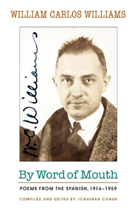  "Superbly compiled, edited, and annotated by Jonathan Cohen, and with a stimulating preface by Julio Marzán, the bilingual anthology By Word of Mouth is the most important addition to the Williams canon since Christopher MacGowan's edition of Paterson [1992].… Every admirer of Williams' work should own this volume. It does not gather pieces of secondary interest. Rather, Williams' poems from the Spanish are not just well worth reading in their own right; they will also enhance how we understand Williams' original English-language poetry and his evolution as a writer. Our notion of Williams' work in 'the American idiom' should be forever broadened and changed because of By Word of Mouth." — Peter Schmidt, William Carlos Williams Review
"Superbly compiled, edited, and annotated by Jonathan Cohen, and with a stimulating preface by Julio Marzán, the bilingual anthology By Word of Mouth is the most important addition to the Williams canon since Christopher MacGowan's edition of Paterson [1992].… Every admirer of Williams' work should own this volume. It does not gather pieces of secondary interest. Rather, Williams' poems from the Spanish are not just well worth reading in their own right; they will also enhance how we understand Williams' original English-language poetry and his evolution as a writer. Our notion of Williams' work in 'the American idiom' should be forever broadened and changed because of By Word of Mouth." — Peter Schmidt, William Carlos Williams Review
"A splendid surprise." — Patrick Dunagan, NewPages
"Jonathan Cohen shows us why translation is crucial to understanding Williams, who approached it as an essential act of poetry. The poet emerges as the first among our modernist writers to see the literary value of translating classical and contemporary verse from both Spain and Latin America. By Word of Mouth makes that clear." — Edith Grossman, author of Why Translation Matters
"Almost fifty years after his death, incredibly, the
great American poet William Carlos Williams has published his first book of translations. Thanks to Jonathan Cohen, who had the skill and the
care — and the awareness — to bring the book into existence, we now have a more complete picture of Williams's poetic practice."
— Jason Weiss, Review: Literature and Arts of the Americas (see reprint in Itineraries of a Hummingbird)
"This book will reinforce the sense of Williams as one deeply invested in the language and rhythm of the New World North as well as South." — Paul Mariani, author of William Carlos Williams: A New World Naked
"It seems clear that Williams is the twentieth-century poet who has done most to influence our very conception of what poetry should do, and how much it does not need to do." — Adam Kirsch, New York Review of Books
"Jonathan Cohen, thank[s] so much for the WCW translations. It's hard to believe they had to wait so long to find a way into the world. You've done a real service to poetry." — U.S. Poet Laureate Philip Levine (personal communication)
"This book affirms that the most American poet of them all, William Carlos Williams — the poet of 'the American idiom' — also had Latin American and Caribbean roots." — Ernesto Cardenal
"Williams used translation as an extension of his program to 'create a modern poetics based on American speech, thought, and
experience.'… [His] 'Prelude in Boricua,' made upon his return from Puerto Rico, comes close to being a virtuosic rendering of Luis Palós Matos's 'Preludio en boricua': 'Mixup of kinkhead and high yaller / And other big time mixups. / Messaround of voodoo chatter.'… Cohen's By Word of Mouth joins a handful of (relatively) recent titles focusing on the translational activities of writer-translators." — Gregary J. Racz, Metamorphoses
"By Word of Mouth: Poems from the Spanish, is (besides being a book of wonderful poems) a reminder that Williams's call for 'American speech' in American poetry wasn't mere United States-ian nationalism. It was a vision of poetry that encompassed the entire New World." — Greer Mansfied, Bookslut
"Williams' early understanding of the relevance of transnational, multilingual, American dialogue is more relevant today than ever." — Julio Ramos, author of Divergent Modernities: Culture and Politics in Nineteenth-Century Latin America
"Cohen understands Williams's 'American idiom' in transnational vernacular terms." — Tomás Urayoán Noel, Small Axe
"In the translations [By Word of Mouth], Carlos rises to the surface to speak of intangibles. In this way the translations fit into the 'scheme' of stasis, his two cultures bridged. They are another celebration of his Carlos lineage, transmitting to this culture its 'mingling' spirit — Bill tensely fused with Carlos is Williams the American poet." — From the Foreword by Julio Marzán, author of The Spanish American Roots of William Carlos Williams
|
"For Those Dead, Our Dead …" [T]. By Ernesto Cardenal. Being Human. Ed. Neil Astley. Highgreen, Eng.: Bloodaxe. 360.
"Newly-Discovered Translations by William Carlos Williams; Pablo Neruda's 'Ode to My Socks' and Eugenio Florit's 'Conversation with My Father'" [C]. Hudson Review 64.1: 43–51.
"On William Carlos Williams's Translation of Ernesto Mejía Sánchez's 'Vigils'" [C]. Words Without Borders, July 14.
"Some Thoughts for Reviewers of Literary Translations" [C]. With Susan Bernofsky and Edith Grossman. Words Without Borders, March 23.
"Stardust" [T]. By Ernesto Cardenal. Birds, Beasts, and Seas: Nature Poems from New Directions. Ed. Jeffrey Yang. New York: New Directions. 125.
"Swans" [T]. By Enrique Lihn. Birds, Beasts, and Seas: Nature Poems from New Directions. Ed. Jeffrey Yang. New York: New Directions. 131.
"Tavern" [T]. By Roque Dalton. From a Terrace in Prague. Ed. Stephan Delbos. Prague: Litteraria Pragensia. 153–70. [" … a beautiful and fulfilling anthology … Poems such as Roque Dalton's 'Tavern' and many others just sing and inspire … " — Ed Sanders]
2010
"The Earth's Dreams: Raúl Zurita's Purgatory and Other Sequences" [C]. Review: Literature and Arts of the Americas. 43.2: 285–89.
"For Those Dead, Our Dead …" [T]. By Ernesto Cardenal. The Ecco Anthology of International Poetry. Eds. Ilya Kaminsky and Susan Harris. New York: Ecco Press. 297.
"For You" [P]. Long-Islander, March 25: A11.
"Into the American Idiom: William Carlos Williams' Translation of Jorge Carrera Andrade's 'Dictado por el agua'" [C]. Translation Review 77/78: 28–42. ["The best new scholarship in Latin American translation studies." — Charles Hatfield, University of Texas at Dallas]
2009
"The Father's Monologue with His Infant Son" [T]. By Enrique Lihn. Oxford Book of Latin American Poetry. Eds. Cecilia Vicu a and Ernesto Livon-Grosman. New York: Oxford UP.
367–69.
Pluriverse: New and Selected Poems [T]. By Ernesto Cardenal. Editor and translator, with trs. Mireya Jaimes-Freyre, John Lyons, Thomas Merton, Robert Pring-Mill, Kenneth Rexroth, and Donald D. Walsh. New York: New Directions.
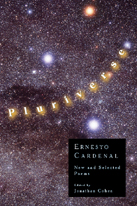  "Ernesto and I gave an open-air poetry reading, plus a little ceremony in which I presented to him a seed from Pasternak's grave given to me by the Russian poet Andrei Voznesensky. I don't know whether Ernesto ever planted this symbol of freedom, but he himself is such a seed." — Lawrence Ferlinghetti, in the Foreword
"Ernesto and I gave an open-air poetry reading, plus a little ceremony in which I presented to him a seed from Pasternak's grave given to me by the Russian poet Andrei Voznesensky. I don't know whether Ernesto ever planted this symbol of freedom, but he himself is such a seed." — Lawrence Ferlinghetti, in the Foreword
From the Reviews …
"Readers of English, thank your gods: the breadth of Ernesto Cardenal's amazing poetic career is now available for our consumption." — Vincent Francone, Three Percent
"Clear, impassioned, brilliant. Beautiful." — Richard Rayner, Los Angeles Times
"Cardenal shows his rarest talent — the ability to love and be angry in one perfectly formed phrase." — George Wallace, Poetrybay
"One can only admire the feat of creating an amazingly coherent selection from such a vast literary output.… [A]ll these poems … are essential reading in this well-selected and expertly-translated anthology." — Steven F. White, Review: Literature and Arts of the Americas
"Cohen's collection, the largest selection of Cardenal's work so far in one volume in English, suggests that we have far more to learn about this poet, especially in the way, like most strong poets, that he opens himself so vividly to such a wide range of experience. Indeed, in Cardenal's many commitments and contradictions, and his deep involvement with North American poetry and culture, this volume suggests we could probably better understand our own poetry — and perhaps even country — if we were to study his." — David J. Rothman, Hudson Review
"Highly recommended for all libraries and could be used as a text for courses in multicultural and ethnic studies." — Alva V. Cellini, MultiCultural Review
"Absorbing and sweeping narrative verse." — Ray Olson, Booklist
"Essential for poetry and Latin American collections." — Jack Shreve, Library Journal
"Pluriverse selects the most significant and varied work from Cardenal's long practice." — Ron Slate, On the Sea Wall
"[T]hese works are gracefully unified through an exploration of the possible intersection between political and spiritual life." — Kristina Marie Darling, Literary Review
"A worthy tribute to this living legend. The diversity of the work serves to enhance the overall experience." — Joseph D. Haske, American Book Review
"Cohen's final words are [in the Introduction]: 'And so, here they are — to gladden your heart and enrich your soul.' I agree. For being such well-crafted versions in English, these translations will gladden the heart, enrich the soul, and reach a wide audience." — Anne Fountain, Translation Review
|
2008
Fragments of "Martí in New York (1895)" [P]. Long Island Sounds: An Anthology of Poetry. Ed. Tammy Nuzzo-Morgan. Southampton, NY: North Sea Poetry Scene Press. 341–43.
"Psalm 5" [T]. By Ernesto Cardenal. Golden Handcuffs Review 1.10: 162–63.
"Translating Cardenal's 'Managua 6:30 P.M.': The Challenge of the Kiss and Other Things" [C]. Yearbook of Comparative and General Literature 54: 152–61.
2007
"In Bryant's Footsteps: Translating Nicaragua's Cardenal" [C]. 91st Meridian 5.1. International Writing Program, U of Iowa.
"Streets"; "Tangier"; "Birthday in Belgium"; "Rendezvous" [P]. Poetryvlog.com.
"To Walt Whitman" [P]. Long Islander, August 2: A9.
2006
"Cedar Hill"; "Walt Whitman" [P]. The Light of City and Sea. Ed. Daniel Thomas Moran. Sound Beach, NY: Street Press. 39–40.
Countersong to Walt Whitman [T]. By Pedro Mir. Washington: Azul Editions. Excerpts in Logos 5.3.
"For Those Dead, Our Dead …" [T]. By Ernesto Cardenal. Poems to Live By: In Troubling Times. Ed. Joan Murray. Boston: Beacon Press. 87–88.
2005
"Managua 6:30 P.M." [T]. By Ernesto Cardenal. Rattapallax 12: 19.
"Muna Lee" [C]. Encyclopedia Latina:
History, Culture, and Society in the United States. Ed. Ilan Stavans and Harold Augenbraum. Vol. 2. Danbury, CT: Scholastic Library Publishing. 431–32.
"The Tishomingo (1855)" [P]. Long Islander, July 14: A9.
2004
"Neruda in English: Establishing His Residence in U.S. Poetry" [C]. MultiCultural Review 13.4: 25–28.
A Pan-American Life: Selected Poetry and Prose of Muna Lee [C]. Madison: U of Wisconsin P.
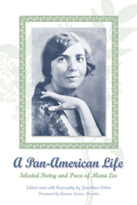  "Jonathan Cohen has given us the exquisite gift of recognition: the life of Muna Lee a poet, essayist, human rights activist, and indeed a visionary and fervent Pan-Americanist. Through Cohen's insightful and original biography, readers will get to know, as well as love, the spirit of Muna Lee, one of the most extraordinary and creative figures of the twentieth century, a builder of bridges and hopes. Cohen's work will not allow us to forget her. More so, it rescues her from the invisibility of her work and life. A magnificent tribute to a magnificent woman." — Marjorie Agosín, author of A Map of Hope
"Jonathan Cohen has given us the exquisite gift of recognition: the life of Muna Lee a poet, essayist, human rights activist, and indeed a visionary and fervent Pan-Americanist. Through Cohen's insightful and original biography, readers will get to know, as well as love, the spirit of Muna Lee, one of the most extraordinary and creative figures of the twentieth century, a builder of bridges and hopes. Cohen's work will not allow us to forget her. More so, it rescues her from the invisibility of her work and life. A magnificent tribute to a magnificent woman." — Marjorie Agosín, author of A Map of Hope
"Jonathan Cohen's edition of Muna Lee's work and the accompanying biographical essay function as a combined project of historical recovery.… It reclaims Lee's place among American poets and establishes the importance of her work as a pan-Americanist.… This collection, by gathering a significant selection of her work, helps us begin to appreciate an important figure in pan-American literature." — Lizabeth Paravisini-Gebert, Review: Literature and Arts of the Americas
"Para entender a Muna Lee y su mundo hay que leer este libro sin perder una línea. Es un viaje de descubrimiento que les dejar asombrados." [To understand Muna Lee and her world, it is necessary to read this book without missing a line. It is a journey of discovery that will amaze you.] — Sonia L. Cordero, El Vocero
"A poet who is also a sound scholar, a mistress of tongues, and a profound believer in a cause is a rare and wonderful thing. Muna Lee is all four." — Archibald MacLeish, The American Story
|
2003
"Prayer for Marilyn Monroe" [T]. By Ernesto Cardenal. Review: Latin American Literature and Arts 67: 13–14.
"Toward a Common Destiny on the American Continent: The Pan Americanism of Gabriela Mistral" [C]. Gabriela Mistral: The Audacious Traveler. Ed. Marjorie Agosín. Athens: Ohio UP. 1–18.
"Walt Whitman in Ohio" [P]. Visiting Walt: Poems Inspired by the Life and Work of
Walt Whitman. Eds. Thom Tammaro and Sheila
Coghill. Iowa City: U of Iowa P. 28.
2002
"Paumanok"; "Poospatucks (1875)"; "Rendezvous" [P]. Improper Hamptonian: 18.
1999
"A Museum in Kampuchea" [T]. By Ernesto Cardenal.
Scanning the Century: The Penguin Book of the Twentieth
Century in Poetry. Ed. Peter Forbes. London: Penguin.
226–27.
1998
"For Those Dead, Our Dead …" [T]. By Ernesto Cardenal.
The American Voice Anthology of Poetry. Ed. Frederick
Smock. Lexington: UP of Kentucky. 17–18.
"Waldeen and the Americas: The Dance Has Many Faces" [C; rev.
vers.]. A Woman's Gaze: Latin American Women Artists. Ed.
Marjorie Agosín. Fredonia, NY: White Pine Press. 224–42.
1996
"The Art of Translation" [C]. Literary Cavalcade 49.2: 28–29.
"León"; "Lights" [T]. By Ernesto Cardenal. Twentieth-Century Latin American Poetry. Ed. Stephen Tapscott. Austin:
U of Texas P. 297–98, 301–02.
"Revolution" [T]. By Enrique Lihn. Twentieth-Century Latin
American Poetry. Ed. Stephen Tapscott. Austin: U of Texas P.
321–22.
Small Hours of the Night [T]. By Roque Dalton.
With trs. James Graham, Ralph Nelson, Paul Pines, Hardie St.
Martin and David Unger. Willimantic, CT: Curbstone Press.
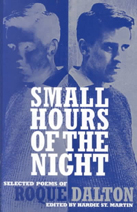  "Finally and gloriously here are the poems of Roque Dalton, one of the most compelling Central American poets it has been my privilege to read." — Ariel Dorfman, author of Last Waltz in Santiago
"Finally and gloriously here are the poems of Roque Dalton, one of the most compelling Central American poets it has been my privilege to read." — Ariel Dorfman, author of Last Waltz in Santiago
"Roque Dalton once addressed a poem to a woman asking that she never speak his name when he was dead because he would rise from the ground at the sound of her voice, and he should have 'earned silence' by then.… Small Hours of the Night is filled with images of freedom, like birds and music, without reference to social reality. He speaks of his 'itinerant heart,' which expresses itself in rambling, fanciful catalogues and delirious non sequiturs. A surprising Roque Dalton speaks up, sounding like a Jack Kerouac who really lived and suffered, not in spurts on the American highway supported by Auntie back home but on the long, hard roads of exile. This voice culminates in 'Tavern.'" — Chris King, Nation
"The early poems, those from a young revolutionary, are full of extravagance: 'I have this wild itch to laugh / or kill myself' and 'I don't believe in angels / but the moon is now dead for me.' As Dalton's poetry matures, his imagination ranges, sometimes recklessly, running from line to line without regard for negative space or silence, but never without passion. 'Man uses his old disasters like a mirror. / An hour or so after dusk / the man picks up the painful remnants of his day / and worried sick he puts them right next to his heart / he sweats like a TB patient fighting for his life / and sinks into his deep lonely rooms.'
"Many of the poems written in exile in Mexico and Cuba are manly, wine-drinking montages of life on the Communist edge. In the section 'Tavern and Other Places,' he is at his best: creatively illuminating the soul of his home country; cataloguing with humility his experiences as a soldier; and musing over some of his prisonmates, soldiers, friends and countrymen. Here Dalton achieves a ripe, formal confidence in which meaning and expression are fully integrated. The final, wry poems punch small holes in bourgeois religion, politics and life. This is the most comprehensive and scholarly edition of Dalton's poetry available in English." — Publishers Weekly
"All in all, Small Hours of the Night represents an invaluable contribution to Dalton studies, and is to be commended in particular for the high quality of its translations." — Gregary J. Racz, Review: Literature and Arts of the Americas
"This selection, brilliantly rendered by a team led by master translator Hardie St. Martin, crackles with energy, anger and desire, with almost none of the sense of agenda one might suspect in so partisan a poet.… This is a book for all the Americas, south and north, and one of the most important to be published this year." — Thomas R. Smith, Star Tribune
"For too many years, the poetry of Roque Dalton has been largely unavailable in English. Hardie St. Martin has edited these powerful, fiery, various selected poems, providing a clear critical preface and many of the volume's best translations alongside fine translations by others. It is a great gift to American poetry." — Liz Rosenberg, Boston Sunday Globe
"He was brilliant. His presence alone gave off light." — Juan Gelman, author of Unthinkable Tenderness
"[Dalton's poetry illustrates] his profound conviction that the poet can and must, in his life as in his work, serve as the finely-honed scalpel of change, both in word and deed." — Claribel Alegria, author of Luisa in Realityland
|
"Therapeutics" [T]. By Roque Dalton. American Poetry
Review 25.5: 10.
1995
"Room 5600" [T]. By Ernesto Cardenal. City Lights Pocket
Poets Anthology. Ed. Lawrence Ferlinghetti. San Francisco:
City Lights. 211–17.
"With Walker in Nicaragua" [T]. By Ernesto Cardenal.
Research Publications' American Journey: The Hispanic-American
Experience. Eds. Frank De Varona, Frank Menchaca, Bryce
Milligan, et al. Woodbridge, CT: Primary Source Media.
1994
"Madrigal"; "With Eyes Closed"; "Stars and Cricket"; "Homage
to Claudius Ptolemaeus"; "Epitaph on No Stone"; "Wind, Water,
Stone" [T]. By Octavio Paz. The Age of Koestler. Ed.
Nicolaus P. Kogon. Kalamazoo, MI: Practices of the Wind. 215,
229, 403, 431, 513, 595.
"This is the bridge …" [T]. By Homero Aridjis. The Age
of Koestler. Ed. Nicolaus P. Kogon. Kalamazoo, MI: Practices
of the Wind. 790.
1993
Countersong to Walt Whitman & Other Poems [T]. By Pedro Mir. With tr. Donald D. Walsh. Washington: Azul Editions.
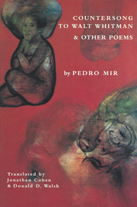  "We need a lot more books in English about the Dominican experience. Fortunately the field is growing, and there's some good stuff out there. I recommend one start with one of the country's greatest poets, Pedro Mir, his Countersong to Walt Whitman and Other Poems. Pure genius." — Junot Díaz, New York Times
"We need a lot more books in English about the Dominican experience. Fortunately the field is growing, and there's some good stuff out there. I recommend one start with one of the country's greatest poets, Pedro Mir, his Countersong to Walt Whitman and Other Poems. Pure genius." — Junot Díaz, New York Times
"[Mir's] poetry achieves a rare, exceptionally felicitous marriage of poetry and politics, of individual sensibility and the chronicling of quotidian collective drama, the still unfulfilled promise of Latin America, its landscape, peoples, and societies.… The translations convey the colloquial pulse and feel, the allusive, melodic reverberations of Mir's exacting expertise." — Roberto Márquez, Village Voice
"The present bilingual edition will give both Spanish- and English-speaking readers the opportunity to recognize themselves in the poetic visage of one of the most authentic literary artists to have come from the Caribbean. Readers will find here a voice that speaks to the world as urgently as it does to the Dominican people." — From the Introduction by Silvio Torres-Saillant
"Su traducción me ha fascinado. Sin ser literal, ni mucho menos, es tan fiel y conserva tanto el estilo mismo y en general el espíritu del poema, que a veces pienso que supera el original." [Your translation fascinates me. Without being literal, not in the least, it is so faithful and preserves the very style and on the whole the spirit of the poem so much, that at times I think it surpasses the original.] — Pedro Mir, letter to Jonathan Cohen
|
1991
"The Naming of America: Vespucci's Good Name" [C]. Encounters 7: 16–20.
"Selected Resources [for Literary Translators]." A Handbook for Literary Translators. 2nd ed. Prep. Translation Committee PEN American Center. New York: PEN American Center.
24–32.
1989
"Waldeen and the Americas: The Dance Has Many Faces"
[C]. American Voice 16: 58–73.
1988
"The Naming of America: Fragments We've Shored against
Ourselves" [C]. American Voice 13: 56–72.
"Oquendo's 'Rain': A Choral Rendering" [C]. American Voice 10: 82–112.
"The Parrots" [T]. By Ernesto Cardenal. Anthology of Magazine Verse & Yearbook of American Poetry (1986/1987).
Beverly Hills: Monitor. 80.
1987
"Among Facades"; "Malta" [T]. By Ernesto Cardenal. City Lights Review 1: 191–93.
"Apparition in Hamburg"; "A Glass of Water in Cologne";
"Empty Shelves"; "A Museum in Kampuchea" [T]. By Ernesto Cardenal. Translation 18: 246–53.
From Nicaragua, with Love: Poems (1979–1986) [T]. By Ernesto Cardenal. San Francisco: City Lights.
  "From Nicaragua, with Love offers a sweeping view of the landscape of Ernesto Cardenal's poetry as it has developed after the 1979 Nicaraguan revolution. The liberation theology of this impassioned poet-priest is inherent in his poetry as it is in his public life, for these poems articulate his hope for a 'society of love' in Nicaragua, which is what the revolution means to him.
"From Nicaragua, with Love offers a sweeping view of the landscape of Ernesto Cardenal's poetry as it has developed after the 1979 Nicaraguan revolution. The liberation theology of this impassioned poet-priest is inherent in his poetry as it is in his public life, for these poems articulate his hope for a 'society of love' in Nicaragua, which is what the revolution means to him.
"Most of the poems in this volume appear here in English for the first time, and they include victory poems, love poems, elegies, ecological and travel poems. These are poems of history in the making, in the sense of social commitment, but also in the deeper sense of personal history — poems of 'love in the making.'
"In his introduction, Jonathan Cohen reviews Cardenal's recent concerns, and he has provided a chronology of his life and literary works." — From City Lights
"The outstanding socially committed poet of his generation in Spanish America." — Times Literary Supplement
|
"In Bryant's Footsteps: Translating 'Con Walker en Nicaragua'" [C]. American Voice 6: 78–91.
Introduction [C]. From Nicaragua, with Love. By Ernesto Cardenal. San Francisco: City Lights. 1–6.
"Walt Whitman in Ohio" [P]. Agni Review 24/25: 241.
1986
"For Those Dead, Our Dead …" [T]. By Ernesto Cardenal. American Voice 2: 100.
"The Price of Bras" [T]. By Ernesto Cardenal.
Massachusetts Review, 27.3–4: 510.
"Vision from the Blue Plane-Window"; "Founding of the Latin American Association for Human Rights"; "The Parrots"; "New Ecology"; "At the Tomb of the Guerrilla" [T]. By Ernesto Cardenal. Agni Review 23: 73–80.
1985
"León" [T]. By Ernesto Cardenal. Nation 238.3: 100.
Neruda in English: A Critical History of the Verse Translations and Their Impact on American Poetry [C].
Ann Arbor: UMI Dissertation Publishing.
1984
"From Nicaragua, with Love" [C]. Introduction. With Walker in Nicaragua and Other Early Poems (1949–1954). By Ernesto Cardenal. Middletown: Wesleyan UP. 3–17.
With Walker in Nicaragua and Other Early Poems
(1949–1954) [T]. By Ernesto Cardenal. Middletown: Wesleyan UP.
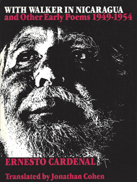  "There could hardly be a better introduction to Cardenal than Jonathan Cohen's beautifully edited and really brilliant translations of his early poems. With Walker in Nicaragua is an admirable book in every way. There are two extraordinary poems in it, all of the poems are interesting, the introductory essay is helpful, clear, and brief, and Cohen's translations are so good you feel that the poems might have been written in English." — Robert Hass, Washington Post [entire review]
"There could hardly be a better introduction to Cardenal than Jonathan Cohen's beautifully edited and really brilliant translations of his early poems. With Walker in Nicaragua is an admirable book in every way. There are two extraordinary poems in it, all of the poems are interesting, the introductory essay is helpful, clear, and brief, and Cohen's translations are so good you feel that the poems might have been written in English." — Robert Hass, Washington Post [entire review]
"The Cardenal of most interest to me is the poet of the late 1950s and early 1960s, whose work is represented in With Walker in Nicaragua, translated with great accuracy, simplicity and beauty by Jonathan Cohen.… Publication of With Walker in Nicaragua in English provides us with examples of some of the best poetry of a modern master." — Richard Elman, Nation
"Cardenal's unique blending of the roles of Cultural Prime Minister, poet and priest is most impressive, and the poems in With Walker in Nicaragua illuminate the path that that person traveled to become the present one. Jonathan Cohen's well-researched introduction provides some facts of that journey and a good overview of the poet's work. The translations are first-rate." — Harris Schiff, American Book Review
"Jonathan Cohen's translations are as direct as Cardenal's style, with his honesty of language and intent, and manage to convey the spirit of the work well." — Kevin Ducey, Bloomsbury Review
"Cohen's decision to select these early texts by Cardenal and publish them in a bilingual edition is to be commended. The chronological treatment of Cardenal's development as a poet does a service to both Cardenal and readers.… The selection offered by Cohen in With Walker in Nicaragua helps us to understand the inspirational process by which Cardenal has been able to become the 'best-known living writer' not only of Nicaragua but of the whole continent." — Santiago Dayd Tolson, Review: Latin American Literature and Art
"Noted with Pleasure." — New York Times Book Review
"A small but intense book, well organized around the title poem.… This emphasis on history in South American poets is one of their great gifts, and the poetry is a kind of example to North American poets. For that alone, it is [a] precious … and timely book. The poetry is … carried along by some purity of intention, lifting the language.… Cohen's translation is excellent. He follows the Spanish text scrupulously … with great aplomb and flair." — Robert Bly, author of The Light around the Body
|
1983
"The Filibusters"; "Greytown"; "John Roach, Mariner" [T]. By
Ernesto Cardenal. American Poetry Review 12.3: 18.
"Neruda in English: The Controversy over Translation Poetics"
[C]. Missouri Review 6.3: 176–92.
"Raleigh"; "Star Found Dead on Park Avenue" [T]. By Ernesto
Cardenal. New Directions in Prose and Poetry 46. New York: New Directions. 105–09.
"Squier in Nicaragua" [T]. By Ernesto Cardenal. Denver
Quarterly 18.3: 17–25.
"With Walker in Nicaragua" [T]. By Ernesto Cardenal.
Ironwood 11.1: 61–74.
1982
"The Early History of Neruda in English, 1925–1937" [C].
Romance Notes 22.3: 272–76.
"In the Subway Stream"; "Old Lady on the Subway"; "Hypermanhattan" [T]. By Enrique Lihn. New Directions in
Prose and Poetry 44. New York: New Directions. 155–56.
1981
"The Poetics of Translating Neruda" [C]. Review of Translating Neruda: The Way to Macchu Picchu, by John
Felstiner. Review (Center for Inter-American Relations)
29: 83–85.
"Port Jefferson '76" [P]. Paumanok Rising. Eds. Vince Clemente and Graham Everett. Setauket, NY: Four Rivers. 185–86.
1980
"Discovering Neruda: An Interview with H. R. Hays" [C].
Translation Review 6: 29–34.
"Lights." [T]. By Ernesto Cardenal. In These Times
4.36: 12.
Neruda in English: A Critical History of the Verse Translations and Their Impact on American Poetry [C]. Stony Brook: State University of New York.
"Paumanok" [P]. On Good Ground. Eds. Ray Freed and Jim
Tyack. Port Jefferson, NY: Street Press. 15–16.
"Song of Lempira" [T]. By Ernesto Cardenal. International
Poetry Review 6.2: 78–87.
"Trip to New York" [T]. By Ernesto Cardenal.
Sun 4.3: 23–37.
Zero Hour and Other Documentary Poems [T]. By Ernesto Cardenal. With trs. Paul W. Borgeson, Jr.,
Robert Pring-Mill and Donald D. Walsh. New York: New Directions.
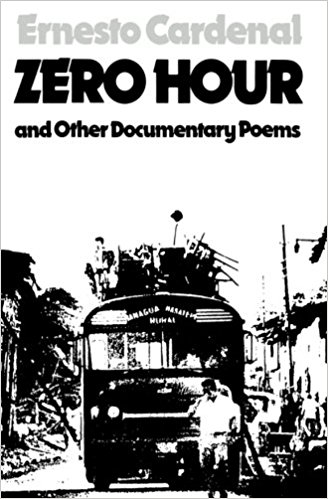  "Zero Hour and Other Documentary Poems brings together in English translation eight of the longer poems by Nicaragua's impassioned Marxist priest, Ernesto Cardenal, described in the Times Literary Supplement as 'the outstanding socially committed poet of his generation in Spanish America.' His work, like Pablo Neruda's, is unabashedly political; like Ezra Pound's, his poems demonstrate history on an epic scale — but the voice is all his own and speaks from the heart of a land sunk for generations in poverty, oppression, and turmoil.
"Zero Hour and Other Documentary Poems brings together in English translation eight of the longer poems by Nicaragua's impassioned Marxist priest, Ernesto Cardenal, described in the Times Literary Supplement as 'the outstanding socially committed poet of his generation in Spanish America.' His work, like Pablo Neruda's, is unabashedly political; like Ezra Pound's, his poems demonstrate history on an epic scale — but the voice is all his own and speaks from the heart of a land sunk for generations in poverty, oppression, and turmoil.
"As both activist and contemplative, Cardenal maintained strong ties with the Sandinist guerillas while at the same time living a form of primitive Christianity at his religious settlement of Our Lady of Solentiname on an island in Lake Nicaragua. In late 1977, amid increasing civil violence, the Nicaraguan National Guard utterly destroyed the Solentiname community, and Cardenal fled to neighboring Costa Rica, where he continued his efforts on behalf of the revolutionary movement. With the final collapse of the Somoza dictatorship in 1979, he returned to Nicaragua as his country's new Minister of Culture. Spanning a quarter century, the poems in Zero Hour constitute a vivid record of continuous struggle against flagrant exploitation and brutal indifference to common humanity."
"One need have no doubts about Cardenal's objective in writing poetry — his aim is clearly ethical and political. There is no ivory tower art for art's sake portrayed in any of the poems presented in this collection.… [B]oth dazzling and didactic, narrative and yet complicated, simple yet profound, national yet universal, political and yet religious. Cardenal has written a poetry that is revolutionary both in content and in form. He demands our collaboration not only in his creative process but also in the physical, social and political world that he is trying to effect by change. On the whole, he has been well served by his translators, Donald D. Walsh, Paul W. Borgeson, Jr., Jonathan Cohen, and Robert Pring-Mill, whose introductory essay is illuminating and interesting." — John Waler, Latin American Literary Review
"[Cardenal] astonishes by daring to push poetry to its limits." — James Finn Cotter, Hudson Review
"Cardenal is a major epic-historical poet, in the grand lineage of Central American prophet Rubén Darío." — Allen Ginsberg, author of Howl and Other Poems
|
1979
"Living Fossil Is Coming Ashore" [J]. New York Times, June 10, sec. 11 (LI): 21.
Poems from the Island [P]. Port Jefferson, NY:
Street Press.
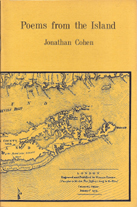
 "Jonathan Cohen has re-created a sense of place, given a 'local habitation and a name' to an island too often seen as simply a wide shoulder for a highway on which people with no history hurry toward no future." — Paul Dolan, author of Tradition in Modern Literary Criticism
"Jonathan Cohen has re-created a sense of place, given a 'local habitation and a name' to an island too often seen as simply a wide shoulder for a highway on which people with no history hurry toward no future." — Paul Dolan, author of Tradition in Modern Literary Criticism
"Poems from the Island is a remarkable poetic sequence. These poems are so refreshing in an age of confessional lyrics. Cohen realizes he isn't the center of the world. His epic voice resonates in the documentary poems here, which advance Pound's canto technique beautifully. He uses Long Island history as a metaphor of American history.…
"There is a certain public appeal to Cohen's work. He seems to be writing not just for the literati, but for the public. I am not surprised The New York Times opened its pages to his poems, in particular his 'Paradise' which integrates prose and verse to create an elegy with real vision and force." — Alice Gold, American Angle
|
1978
The Dark Room and Other Poems [T]. By Enrique Lihn. With trs. John Felstiner and David Unger. New York: New
Directions.
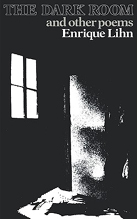  "What amazes me in this collection is that these three translators, poets themselves, have managed to show the poet as he essentially is and have not intruded their own style into what he has to say. This is the soul of good translation: you will defend to the death the way you have done the thing, but you will always defend it as you see, or think, the poet has seen fit. This is one of the best 'collective' collections of translations that I have seen in many a moon wherein the poet has been preserved as he is by those who work on him." — Gregory Rabassa, Parnassus [entire review]
"What amazes me in this collection is that these three translators, poets themselves, have managed to show the poet as he essentially is and have not intruded their own style into what he has to say. This is the soul of good translation: you will defend to the death the way you have done the thing, but you will always defend it as you see, or think, the poet has seen fit. This is one of the best 'collective' collections of translations that I have seen in many a moon wherein the poet has been preserved as he is by those who work on him." — Gregory Rabassa, Parnassus [entire review]
"The greatest Latin American poetry of this century comes from Chile, Patricio Lerzundi points out in his brief introduction to this book. Enrique Lihn (b. 1929) is, with Nicanor Parra (b. 1914), among the most important Chilean poets since the generation of Gabriela Mistral, Vicente Huidobro and Pablo Neruda.… The translations by Jonathan Cohen, John Felstiner and David Unger are faithful to the original Spanish, yet fluent and colloquial. The English versions are so outstanding and so uniform in style that one suspects that each translator reviewed the others' work for improvement." — Charles Guenther, St. Louis Post-Dispatch [entire review]
"Enrique Lihn is a unique poet; like Rimbaud, he is tempted to keep silent. By maintaining the rent between language and reality, however, he has turned the act of writing poetry into its own defense.… The Dark Room and Other Poems, a bilingual edition under the supervision of Patricio Lerzundi, goes a long way in capturing the spirit of the original Spanish. Translation is more than mere rendering, it is an act of interpretation, it presupposes an understanding of the text. In this respect, the three translators — Jonathan Cohen, John Felstiner and David Unger — in a cooperative effort, have truly succeeded in presenting the reader with an authentic speech, with all the richness of its conversational rhythms and colloquial connotations." — George Yudice, Review: Latin American Literature and Art
The Dark Room and Other Poems by Chilean poet Enrique Lihn is a welcome addition to the slowly growing stock of bilingual Spanish-English facing page editions. The well-crafted English translations are by Jonathan Cohen, John Felstiner and David Unger, with a brief introduction by editor Patricio Lerzundi. Lerzundi has done a fine job of integrating the style of the three translators so that they speak with one voice, suffused with Lihn's poetic persona. It is a persona who walks the halls of history observing mankind's vicissitudes over the centuries or examining the course of his own life. In both cases, he looks back at the past and forward to the future with a stoic acceptance that he and the world will muddle through, never succeeding enough to be elated, but not so beaten as to give up completely." — Angela McEwan-Alvarado, Literatura Chilena en el Exilio
"This bilingual collection … is an intelligent selection which introduces the poet to the American reader in his broad-ranging matter and style." — Robert Lima, Library Journal
"Profuse, inspired, and passionate." — Booklist
"Highly recommended." — Choice
"A brilliant and original vision of Latin America." — Roberto Bolaño, author of By Night in Chile and 2666
|
"The Island" [P]. New York Times, Apr. 9, sec. 11
(LI): 21.
"Niagara Falls" [P]. Street Magazine 2.4: 34.
1977
"Album"; "The sea isn't for you to think about …" [T]. By
Enrique Lihn. Street Magazine 2.3: 58–59.
"A Black Poet's View on Christmas 1760: America's First Black Poet" [J]. New York Times, Dec. 25, sec. 11 (LI): 9+.
H.R. Hays & Spanish America [C]. Port Jefferson, NY: Street Press.
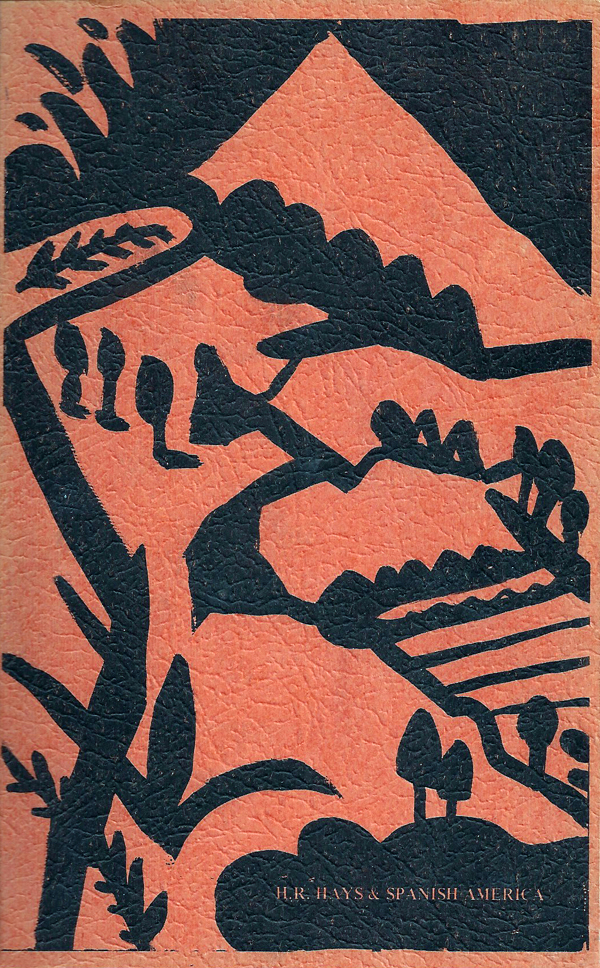  "When I was trying to write my first book, I found the most amazing things in the Reading Rooms — the two big ones with their green lampshades and ecstatic high ceilings — of the New York Public Library on 42nd St; and one of the most astonishing to me was H.R. Hays' 12 Spanish American Poets.
"When I was trying to write my first book, I found the most amazing things in the Reading Rooms — the two big ones with their green lampshades and ecstatic high ceilings — of the New York Public Library on 42nd St; and one of the most astonishing to me was H.R. Hays' 12 Spanish American Poets.
"This book is a mountain pass. How odd that you don't even know of the mountains until you are in the pass! I am grateful to H.R. Hays for so many gifts, in prose and poetry … especially for this gift. I imagine he conceived the book himself, no one asked him for it, and no one thanked him for it, much. Well, so, we can thank him for it now." — From the Foreword by Robert Bly
|
"Kentucky" [T]. By Ernesto Cardenal. Niagara Magazine 7: 18–21.
"The Montauk That Might Have Been: A Dream of Another Miami" [J]. New York Times, Aug. 25, sec. 11 (LI): 21–22.
"'The Most Economical Caribbean Paradises …'"; "The Cotton Fields"; "Calls"; "José Dolores Estrada" [T]. By Ernesto Cardenal. Street Magazine 2.3: 60–63.
"Paradise" [P]. New York Times, Apr. 3, sec. 11 (LI):
26.
"The Phantoms of the Ocean" [J]. New York Times, May
1, sec. 11 (LI): 35.
"Stories Told in Stone: Gravestones as Folk Art" [J]. New York Times, Mar. 6, sec. 11 (LI): 3+.
1976
"Port Jefferson"; "Pygmalion" [P]. Quarry West 5: n. pag.
"Sermon on Blood"; "Sermon on Thunder and Lightning"; "Elegies"; "Out There"; "Sojourn of the Soul Awaiting Peace";
"Sojourn of the Imprisoned Soul" [T]. By Rafael Alberti. Pequod 2.1: 89–95.
1975
"Journey through Streets" [T]. By Javier Heraud. Street
Magazine 2.1: n. pag.
1973
"Captivity"; "On the Passing of Ezra Pound"; "The Left Hand of Darkness" [P]. Soundings (SBU): 64–66.

|
|